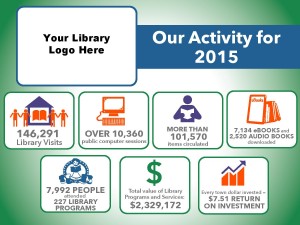Making the Library an Asset for Your Local Elected Officials
 While we’re all dealing with presidential election overload and exhaustion, we can’t ever lose sight of the importance of making our libraries an asset to our local elected officials.
While we’re all dealing with presidential election overload and exhaustion, we can’t ever lose sight of the importance of making our libraries an asset to our local elected officials.
There are some who will still say, “What do we need libraries for? We have Google,” but there are plenty of elected officials who understand the importance of the public library in the community. However, the tension between wanting to get re-elected and, quite possibly, raising local taxes to support the library can be paralyzing for our politicians.
Building friendly and respectful relationships is essential. Showing these leaders how important the library is to the community is the foundation of that relationship.
Before an initial meeting, prepare talking points—so you’ll know what you want to say and stick to your message—and a one-pager you can leave behind. You can give the official a copy of your library’s brochure or newsletter. You can also create something just for her or him that will speak directly to the investment your local municipality makes in your library.
The report prepared annually by your director for your state’s division of library development is a treasure trove of information. It provides you with the data you need to determine the value of your library’s programs and services as well as the taxpayer return on investment (ROI).
Using a simple Excel spreadsheet (for a sample, see Communication Services' ROI calculator), plug in circulation, program attendance, and public computer session numbers, giving you the total value of your library’s programs and services. When you divide that by the amount of tax dollars the library receives, the result is the library’s public service ROI. For example, if the total value is $1.5 million and the library receives $390,000 from your municipality, the public service ROI is $3.85 ($1,500,000 ÷ $390,000 = $3.85).
With this information, you can create a simple infographic that details this data in an easy, attractive one-pager (a sample can be found here). You can use the second side to highlight plans for the current year or begin to lay out your case for increased funding.
THE HUMAN TOUCH
Once you’ve made contact and begun building a relationship, think of ways you can get your elected officials to the library (or bring the library to them).
Think of which programs, such as the opening of summer reading or the premiere of your Maker space, would make a good photo opportunity. What elected officials don’t like to have their picture taken?
Invite the press. But in this day and age of do-it-yourself media exposure, all you need is a smartphone to take a photo and shoot some video. Post on your website and all your social media outlets, thanking the Honorable Local Elected Official for helping to support the library’s efforts. Tag them on social media. Tell them you’ve written up their visit and encourage them to repost. Make sure they know they are welcome anytime.
Make sure all of your elected officials and their staffs are on your library’s email and snail-mail lists. More times than not when I’ve mentioned this to trustees and directors a “V-8 moment” happens—usually, we’re so focused on ensuring that we have our patrons’ email and home addresses correct, we forget to expand our lists beyond that.
RESEARCH SUPPORT
Let’s get outside the library for a moment. Various studies show that people want their libraries to be involved in community issues such as literacy or economic development. How about taking the idea a step further and offering our research and reference expertise to our local pols?
It’s easy. Schedule a meeting with the official at their office. Let them know the library can be their research department. Find out what issues they’re working on and show them how they can research those issues right from their workplace using the library’s databases. Let them know that your reference librarian is available to help with primary and secondary research on their particular community issue, such as what to do with a landfill that’s just about full, or what policy initiatives have other similar-sized communities instituted to welcome an influx of immigrants.
You already know your library is an asset. Your patrons are the daily testament to that. But at times, elected officials can’t see the forest for the trees when it comes to library funding. All they see is that an ask for more money means possibly raising taxes. Creating a positive, asset-driven relationship between the library and these leaders will help address their concerns and position the library as a strong community partner that deserves support.
RELATED
ALREADY A SUBSCRIBER? LOG IN
We are currently offering this content for free. Sign up now to activate your personal profile, where you can save articles for future viewing









Add Comment :-
Comment Policy:
Comment should not be empty !!!